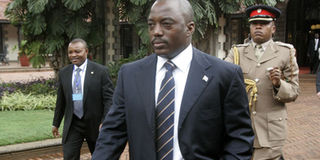Kabila on the spot over mass misery

Democratic Republic of Congo's President Joseph Kabila Photo/REUTERS
Eastern Congo is proving once more to be a major problem to president Joseph Kabila as humanitarian organisations based in the region report 1,000 civilians killed, 7,000 raped and 6,000 homes burned down in a military offensive.
The operation is aimed at driving former Rwandan rebels out of the region.
Code-named Kimia II, the operation’s target is to neutralise Hutu rebels known as the FDLR (Democratic Forces for the Liberation of Rwanda) who operate in the region.
The early phase of the operation was code-named Umoja Wetu and was preceded by a deal between President Kabila and his Rwanda counterpart Paul Kagame.
The main victim was General Laurent Nkunda of the Tutsi CNDP (National Congress for the Defence of the People) now in Rwandese custody.
Being sought
Nkunda’s groups is now led by Jean Bosco Ntaganda, a man who is being sought by the International Criminal Court (ICC) for war crimes.
Despite reports of killings in eastern Congo, according to President Kabila, the region is now enjoying unprecedented peace.
But according to aid groups, close to a million people have been displaced in this region as the army and its allies pursue the former Rwanda rebels.
Says Mr Guillaume Lacaille, senior analyst at the International Crisis Group: “National authorities have not given enough attention to most forces engaged in the eastern Congo operation that have a track record of human rights violations.’’
In particular aid agencies in eastern Congo, through a statement released by Human Rights watch, have called on the UN’s Monuc force to stop logistical support to the forces engaged in the operation.
Besides eastern Congo, President Kabila is also facing a crisis in his ties with Angola which has expelled thousands of Congolese in a tit-for-tat exchange.
Massive powers
Politically, President Kabila, who was elected to a new term in 2006 after taking power in 2001 is sending worrying signals as he abuses the 2005 constitution that called for sharing of power between the provinces and Kinshasa.
The constitution called for an executive Prime Minister and revenue and power-sharing by Kinshasa and the other provinces.
Says Mr Giullaume: “The problem now is the powers enjoyed by Kabila and new people around him”.
One of those calling the shots in Kinshasa is Mr Katumba Mwanke who holds no elected post but wields massive powers.
Mr Mwanke’s appearance on the scene follows the ousting of the Speaker of the National Assembly Mr Vital Kamerhe after he questioned the Rwanda-Congo deal.
With Kabila now fully in charge, it is unlikely local elections planned for October 2010 will take place. The government says it has no money for the polls. Also affected are presidential and Parliamentary polls set for 2011.




